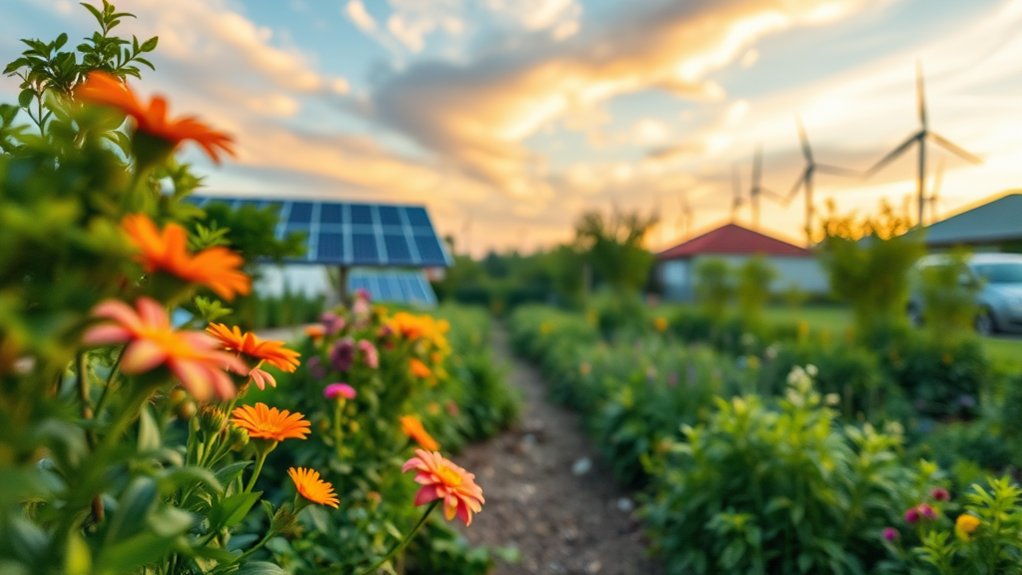Key Takeaways
- Climate change policies are driving significant investments into renewable energy and sustainable infrastructure.
- The growth in green jobs offers new opportunities, but financial challenges may arise for some community members.
- Local governments face the challenge of ensuring all voices, particularly those of underrepresented groups, are heard.
The Impact of Climate Policies on Local Communities
If you've noticed the world is a bit toastier than before, you're not alone. Climate change policies are reshaping the fabric of your community in countless ways, including supercharging investments into renewable energy and sustainable infrastructure.
Green jobs are blooming, yet financial burdens from these shifts might leave some folks feeling torn.
How are local governments ensuring everyone's voice—especially underrepresented groups—is heard? There's an adventure in discovering that next.
Extreme Weather and Infrastructure Challenges
When the sky darkens and a storm rolls in, you might start thinking about the final big hurricane that knocked out power or the heatwave that dried up local rivers. These extreme weather events are happening more often, impacting your community infrastructure and highlighting the need for infrastructure adaptation. Some states with progressive policies demonstrate significant resilience due to effective economic regulation and environmental protections. Spiritual guidance can also be a source of strength and resilience during challenging times, offering support and calm in facing the impacts of climate change. By focusing on climate resilience, communities can better withstand these natural challenges. A strategic approach is necessary for effective planning to reduce vulnerabilities and enhance the overall durability and adaptability of public structures. Stronger storms, rising sea levels, and temperature swings threaten daily life, but adapting the framework of cities helps mitigate these impacts. However, financial constraints, lack of technology, and policy hiccups can make progress slow, especially in lower-income areas. Engaging local voices in planning helps overcome these challenges, aligning new developments with local needs for a resilient future.
Public Health and Safety Trends
Although the effects of climate change might seem distant, they're actually hitting close to home, right in your community. You see, climate change worsens health disparities, significantly affecting vulnerable groups like the elderly and those lacking healthcare access.
As temperatures rise, extreme heat events drive up mortality rates, especially among people over 65. Just imagine the spread of infectious diseases, from malaria to other vector-borne illnesses, all amplified by warmer climates.
Wildfires fueled by climate change also spread harmful air pollution. Plus, mental health issues aren't left out, with many experiencing anxiety and stress. Access to clean air and water becomes uncertain, potentially compromising your well-being.
Understanding these connections empowers your community to advocate effectively for health-focused climate policies.
Economic Shifts and Community Budgets
Let's talk about how climate change policies are shaking up your community's economy and budgets.
Climate-related cost impacts are substantial, with disasters in 2022 costing over $176 billion in the U.S. However, there's a silver lining—job creation. Local governments are harnessing clean energy technologies, generating new jobs right in your neighborhood.
Plus, energy-saving programs can free up budget space, potentially lowering your taxes. Investment opportunities in low-carbon goods and services are expanding, paving the way for economic growth.
But let's not forget, the financial burden from these actions can hit vulnerable households the hardest. Your community's budget needs smart allocation to fund climate goals, ensuring everyone benefits from these policies.
Addressing systemic barriers in economic transitions is crucial to ensure equitable access to opportunities and prosperity for all community members.
Climate budgeting helps track these commitments.
Community Engagement and Empowerment
Because your voice matters, community engagement and empowerment are vital in shaping climate change policies where you live. By participating in activities like participatory budgeting, you guarantee your community voice is heard. This not only creates fair solutions but also addresses the needs of historically disadvantaged groups who often bear the brunt of climate impact. With participatory methods, you can help prioritize local projects.
Look at how engagement can be structured:
| Stakeholder Group | Role in Engagement | Impact |
|---|---|---|
| Residents | Provide feedback | Tailored policies |
| Local Businesses | Offer resources | Sustainable growth |
| Organizations | Support initiatives | Stronger networks |
Innovation and Sustainable Development Opportunities
As the world faces the challenges of climate change, your community's role in adopting innovation and sustainable development is more important than ever.
By integrating renewable energy like solar and wind, you're reducing dependency on fossil fuels and creating cleaner environments.
Think about how carbon capture technologies can help industries meet climate goals by cutting emissions. These innovations don't just protect the planet but boost local economies too.
Creating green jobs in renewable energy and sustainable technologies is a huge opportunity for economic growth.
With climate-resilient buildings and eco-friendly urban planning, your community can lead the way. Public-private partnerships enhance these efforts, making them stronger.
Together, you can welcome sustainability and develop a thriving, environmentally conscious community.
Conclusion
Harnessing Community Power for a Sustainable Future
Imagine your community as a vibrant mosaic, each piece telling a story of change and resilience. Climate policies act as the winds of transformation, guiding how you shape your future. Get involved—your voice plays a crucial role in influencing public health, community budgets, and innovative advancements. While challenges are inevitable, consider it akin to a modern-day Apollo mission, where our collective efforts launch us toward sustainable success. Remember, your community has the power to creatively navigate these changes. So, let's take action together for a thriving, inclusive tomorrow!










